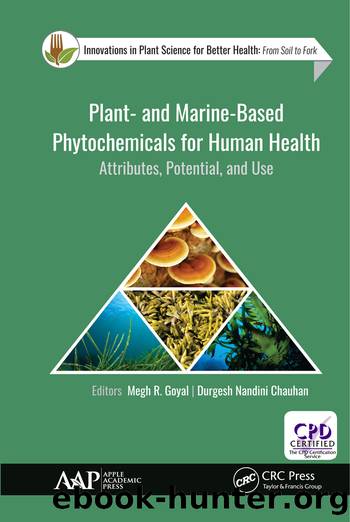Plant- and Marine- Based Phytochemicals for Human Health by Goyal Megh R.; Nandini Chauhan Durgesh;

Author:Goyal, Megh R.; Nandini Chauhan, Durgesh;
Language: eng
Format: epub
Publisher: Apple Academic Press, Incorporated
Published: 2017-07-15T00:00:00+00:00
6.6.4 Anticancer Perspectives
Epidemiological studies have depicted that incidence of cancer is less prominent among people who rely on a variety of fruits and vegetables,59 due to the bioactive compounds that occur mostly in plant foods known as polyphenols and flavonoids. Numerous scientific evidences have proved chemopreventive potential of polyphenols and flavonoids.167 Oxidative stress in body causes damage to DNA thus leading to genetic mutation. These changes diverge cell division cycle (mitosis) and as a result, unwanted cell aggregation, known as “tumor,” forms. Flavonoids protect DNA from oxidative damage by scavenging free radicals produced in the vicinity of DNA and interact with carcinoma produced from detoxification process.21
In a recent scenario, the role of phytochemicals for cancer prevention has been highlighted by the researchers due to their effectiveness and safety. Among different herbal sources, black cumin provides protection against various cancer insurgences. The quest to find out promising chemopreventive agent demands multidimensional perspectives to tackle carcinoma at various stages. In this context, the ability of black cumin as the anti-oncogenic agent has been revealed through various experimental models.56, 77
There are evidences indicating the inverse association between black cumin consumption and occurrence of numerous oncogenic events. It tackles the cancer cells by soothing inflammation and inducing apoptosis. Moreover, it suppresses the expressions involved in nuclear factor kappaB in a dose-dependent manner by its active constituent TQ.118, 130
Previously, colon cancer cell lines were treated with black cumin and noticed a marked reduction in the cell population. It was inferred that TQ in black cumin is responsible for apoptosis induction, arresting the cells in post-initiation stage, and targets different marker proteins.49 Similarly, Rooney and Ryan127 treated HT-29 cancer cell line with black cumin essential oil and observed a marked decline in cell proliferation. Additionally, it imparts apoptosis and arrests the cells in G1 phase. Later, a significant reduction was observed in cell viability of SW-626 human colon cancer cells by TQ application. It was confirmed that cellular destruction, obstruction of cell metabolism, and apoptosis are the major pathways for cancer reduction.110
Besides, TQ treatment has proved efficient to check various cancer cells. It performs the antiproliferative action due to its ability to induce apoptosis, arrests the cells in G1 phase, and reduces metastasis and angiogenesis. Moreover, it modulates the activity of various expressions such as p53, p73, PTEN, STAT3, PPAR-G, and activates the caspases 3, 6, and 8 for apoptosis induction.
The cell cycle arrest is one of the promising mechanisms by which black cumin curtails cancer insurgences. The G1 arrest by black cumin is reported in various cancers such as colon, mammary, and prostate by downregulating the expression of cyclin D1 and p53 and increases the expression of p16. On contrary, lung and breast cancers are inhibited by arresting S and G2 phases through suppressing, E2F-1, E2F-2-regulated proteins, cyclin-dependent kinases-4 (CDK-4), CDK-2, cyclin A, p21 Cip1, and p27 Kip1 expressions.8, 49, 68
Download
This site does not store any files on its server. We only index and link to content provided by other sites. Please contact the content providers to delete copyright contents if any and email us, we'll remove relevant links or contents immediately.
| Automotive | Engineering |
| Transportation |
Whiskies Galore by Ian Buxton(41995)
Introduction to Aircraft Design (Cambridge Aerospace Series) by John P. Fielding(33122)
Small Unmanned Fixed-wing Aircraft Design by Andrew J. Keane Andras Sobester James P. Scanlan & András Sóbester & James P. Scanlan(32796)
Craft Beer for the Homebrewer by Michael Agnew(18237)
Turbulence by E. J. Noyes(8040)
The Complete Stick Figure Physics Tutorials by Allen Sarah(7363)
The Thirst by Nesbo Jo(6932)
Kaplan MCAT General Chemistry Review by Kaplan(6928)
Bad Blood by John Carreyrou(6611)
Modelling of Convective Heat and Mass Transfer in Rotating Flows by Igor V. Shevchuk(6433)
Learning SQL by Alan Beaulieu(6281)
Weapons of Math Destruction by Cathy O'Neil(6267)
Man-made Catastrophes and Risk Information Concealment by Dmitry Chernov & Didier Sornette(6007)
Digital Minimalism by Cal Newport;(5750)
Life 3.0: Being Human in the Age of Artificial Intelligence by Tegmark Max(5549)
iGen by Jean M. Twenge(5409)
Secrets of Antigravity Propulsion: Tesla, UFOs, and Classified Aerospace Technology by Ph.D. Paul A. Laviolette(5367)
Design of Trajectory Optimization Approach for Space Maneuver Vehicle Skip Entry Problems by Runqi Chai & Al Savvaris & Antonios Tsourdos & Senchun Chai(5066)
Pale Blue Dot by Carl Sagan(4996)
